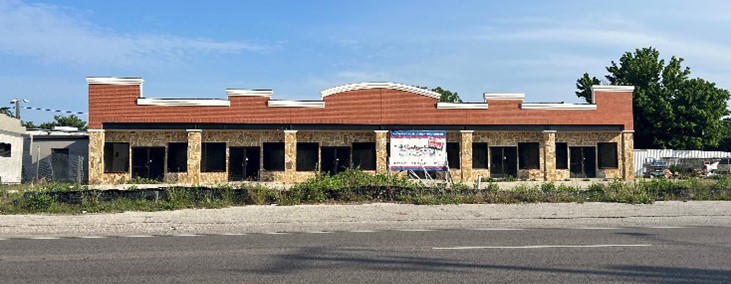Investors are unable to get approval to develop older properties when off-street parking doesn’t meet current codes.
HALTOM CITY, TX, August 20, 2024 /24-7PressRelease/ — In 2023, Austin became the largest city in the United States to stop requiring businesses to have a certain number of off-street parking spots whether they need them or not. A recent article in the Texas Tribune further explains the issue of Why some Texas Cities are getting rid of their minimum parking rules.
Just about every city and town in America has decades-old regulations that require a minimum number of spaces based on a property’s type of use. Parking minimums made sense when land was abundant and automobile ownership was on the rise. However, in today’s economy, these outdated mandates have become barriers to progress. Older commercial properties ripe for renovation sit vacant for years because there’s no way to add parking without buying adjacent land and/or wasting tens of thousands of dollars to add spaces that won’t even be used. Additionally, parking minimums can limit the number of units built on a lot or discourage a builder from adding more bedrooms to a home.
Proponents of the change told the Tribune that parking reform doesn’t’ mean there will no longer be enough parking. They just believe that the decision “should be left up to builders, not local governments.” Tony Jordan, founder of the non-profit Parking Reform Network, seems to agree. He is quoted as saying “The constraint is completely artificial. It’s just based on some number that someone put in a book 40 or 50 years ago.”
The Parking Reform Network is actually a great resource when it comes to parking issues. Among other things, the group maintains a Parking Mandates map showing cities and towns that’ve adopted some type of reform. The number is currently in excess of 1,400, with the scope of reform in each location identified as being regional, city-wide, or limited to a city center or specific district. It appears that most cities have at least reformed their downtown and business districts, which has the greatest impact when it comes to commerce.
By the way, it appears that Austin is not the only city in Texas to take action. Taylor, Bandera and Bastrop are reflected on the map as well. Meanwhile, the City Plan Commission in Dallas established a subcommittee last year to look at the issue of parking reform. A proposal to at least do away with parking minimums for businesses is currently under review.
Haltom City is an ideal candidate for such a change. Business growth in the beleaguered south and central areas is needed to spur revitalization, yet far too many prospective investors have been unable to get approval for their developments due to off-street parking that doesn’t meet current codes. The Haltom United Business Alliance (HUBA) has repeatedly suggested that the City Council take steps to create an overlay district where parking minimums are eliminated and business-friendly policies are adopted. Additionally, HUBA founder Ron Sturgeon launched an initiative called Make Haltom City Thrive Again to educate the general public about the issues and advocate for Council members who will take action.
Ron Sturgeon, one of the founders of Haltom United Business Alliance (HUBA), recently ran headfirst into a really good example of how parking mandates affect redevelopment. He bought a derelict skating rink in Azle, Texas and submitted plans to spend millions of dollars to convert it to a new Salon and Spa in Azle, TX. The facility had been vacant for a decade, and everyone agreed it was an eyesore. At the last minute, the city decided the site did not have enough parking, and required a variance. The Zoning Board of Adjustment refused to grant that, so the property went back on the market, vacant. This was despite Sturgeon obtaining permission from the adjoining property, a large church, to share its mostly unused lot.
When it comes to the benefits of parking reform, even the American Planning Association is on board. In 2022, they reported a “tidal wave” of parking reforms happening across the country and proclaimed “In the smallest of towns and the biggest of cities, these new zoning reform policies help boost small businesses, promote housing development, and put people over parking.”
The question we need to ask ourselves in Haltom City — what exactly will it take for Haltom City to get on board too.
About Haltom United Business Alliance
Haltom United Business Alliance (HUBA) wants to give members of Haltom City’s business community an advocate and to keep those businesses informed about issues that affect them. They want to make sure Haltom City is business friendly and nurtures small business growth, including automotive businesses in the industrial districts, and bring more restaurants including breweries and eventually a major grocery store to the city. New businesses and growth in existing businesses will create a stronger tax base which will allow the city to pay its first responders wages that are competitive with surrounding cities while improving Haltom City’s facilities and infrastructure. HUBA believes that the southern and central parts of the city need a revitalization plan, to prevent further degradation in those areas, and wants that to happen before the inner-city experiences increased crime and more blight. As retail and office uses are in decline, it’s more critical than ever to attract new businesses. They believe that such a plan requires a strong relationship and support of the business community. Anyone who owns a business in Haltom City is eligible to join HUBA. Dues are $20 annually or $50 for a lifetime membership, and membership is 100% confidential. To join, contact Joe Palmer at (682) 310-0591 or by email at HUBAgrp@gmail.com. Visit the group’s Facebook at Haltom United Business Alliance.
About Make Haltom City Thrive Again
Make Haltom City Thrive Again is a movement to return prosperity to the older parts of South and Central Haltom City by luring the small businesses that have left over the past decades back to Haltom City. A vibrant business community not only allows for greater employment and choice of goods and services, but also can ease the tax burden on residents. The movement is led by local entrepreneur and business owner Ron Sturgeon. For more on Sturgeon’s ideas and background, check out his book, Keeping the Lights on Downtown in America’s Small Cities and watch the videos on his Facebook page. Ron is also the founder of the Haltom United Business Alliance (HUBA) which represents existing business interests in Haltom City and promotes growth of diverse businesses. HUBA is not a political action committee and does not endorse candidates. If/when Ron endorses candidates, he will do so on his own via the Make Haltom City Thrive Again organization.
—
For the original version of this press release, please visit 24-7PressRelease.com here




